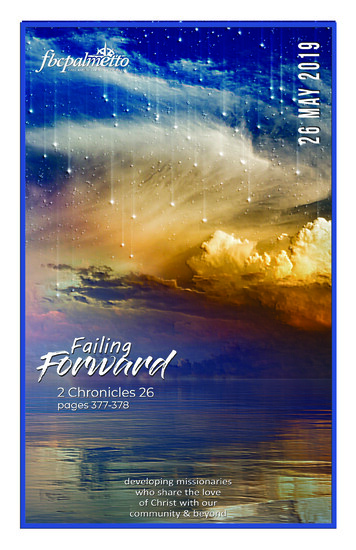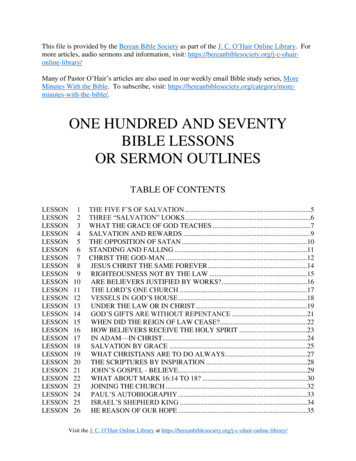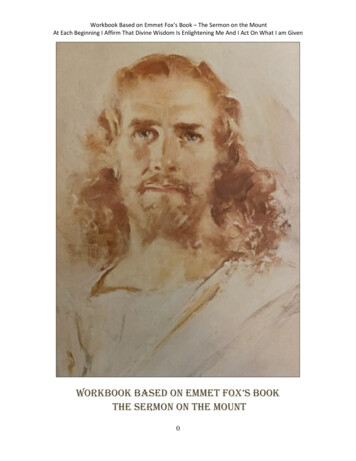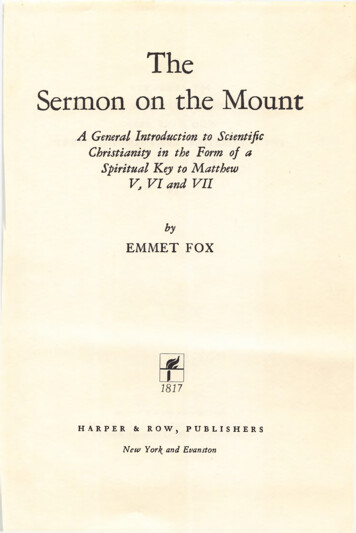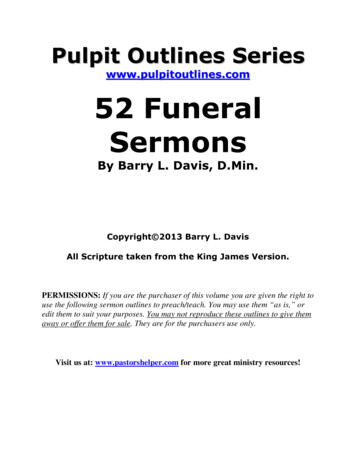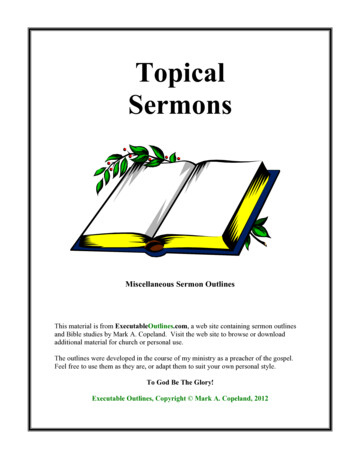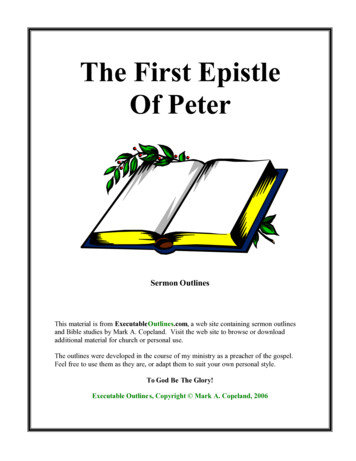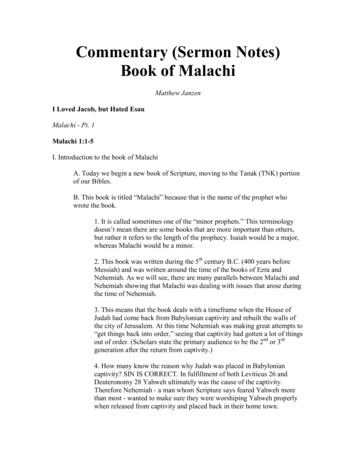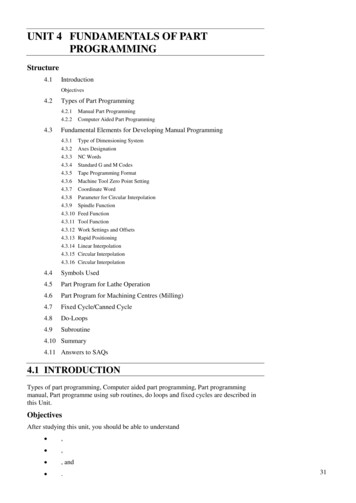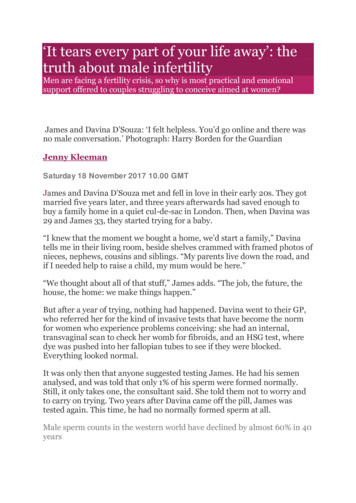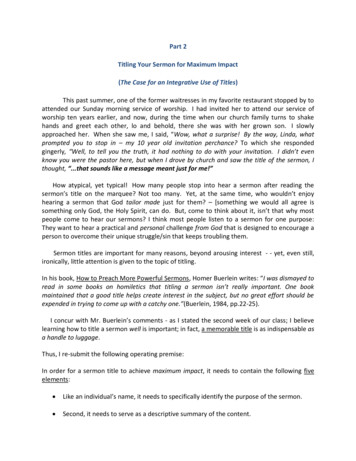
Transcription
Part 2Titling Your Sermon for Maximum Impact(The Case for an Integrative Use of Titles)This past summer, one of the former waitresses in my favorite restaurant stopped by toattended our Sunday morning service of worship. I had invited her to attend our service ofworship ten years earlier, and now, during the time when our church family turns to shakehands and greet each other, lo and behold, there she was with her grown son. I slowlyapproached her. When she saw me, I said, “Wow, what a surprise! By the way, Linda, whatprompted you to stop in – my 10 year old invitation perchance? To which she respondedgingerly, “Well, to tell you the truth, it had nothing to do with your invitation. I didn’t evenknow you were the pastor here, but when I drove by church and saw the title of the sermon, Ithought, “.that sounds like a message meant just for me!”How atypical, yet typical! How many people stop into hear a sermon after reading thesermon’s title on the marquee? Not too many. Yet, at the same time, who wouldn’t enjoyhearing a sermon that God tailor made just for them? – [something we would all agree issomething only God, the Holy Spirit, can do. But, come to think about it, isn’t that why mostpeople come to hear our sermons? I think most people listen to a sermon for one purpose:They want to hear a practical and personal challenge from God that is designed to encourage aperson to overcome their unique struggle/sin that keeps troubling them.Sermon titles are important for many reasons, beyond arousing interest - - yet, even still,ironically, little attention is given to the topic of titling.In his book, How to Preach More Powerful Sermons, Homer Buerlein writes: “I was dismayed toread in some books on homiletics that titling a sermon isn’t really important. One bookmaintained that a good title helps create interest in the subject, but no great effort should beexpended in trying to come up with a catchy one.”(Buerlein, 1984, pp.22-25).I concur with Mr. Buerlein’s comments - as I stated the second week of our class; I believelearning how to title a sermon well is important; in fact, a memorable title is as indispensable asa handle to luggage.Thus, I re-submit the following operating premise:In order for a sermon title to achieve maximum impact, it needs to contain the following fiveelements: Like an individual’s name, it needs to specifically identify the purpose of the sermon. Second, it needs to serve as a descriptive summary of the content.
Third, it should entice the audience in a variety of ways to pay closer attention to thesermon. Fourth, it must be concise, and Fifth, it needs to be memorable.In the first part of this paper, we considered the form and use of titles in the Biblical literature;Moving on, consider how titling is used today in the secular world of communication, ingeneral, and specifically, in advertising.IN THE SECULAR WORLDBecause preaching is a form of persuasive speaking, in the sense that Paul used the word,"persuade" in 2 Corinthians 5:11, it has notable similarities to secular advertising, marketingand political speaking.It is interesting that Jesus noted in "The Parable of the Shrewd Manager" that sometimesthe "people of this world" can be shrewder that the "children of light" with regard to "commonthings". (Luke16:8) Titles, in persuasive communications, are common ground; therefore, wewould do well to include secular wisdom in our consideration of title use.As a matter of good business, titling decisions are made very day. The professional editors,marketing and ad specialists at every publishing firm in the U.S. have to make a titlejudgment/prediction every time a new book is launched. They consider this decision of primeimportance in its public reception so they seldom leave for this the author to determine. Theyhave every financial motive to choose a title for maximum impact. Extremely successful recenttitles have captured the popular imagination and virtually spawned a cottage industry ofsequels and derivation products.Think for example, of “Left Behind”; “Rich Dad, Poor Dad”; “Chicken Soup for the Soul”; “MenAre from Mars; Women Are from Venus.” Thus, the open marketplace of ideas andconsumerism has set its own competitive standard of what a good title entails.It is everywhere axiomatic that, in form, a title should be concise. But how concise isconcise? Book titles tell the story. Consider the titles of the top 15 bestselling fictions togetherwith the top 15 non-fiction novels listed in the New York Times Book Review of June 26, 2011, p.31. -26/e-book-fiction/list.html)Counting even “the and “a” as words, five titles are on word long; ten are two words; eight arecomposed of three; two are four words; one is five words; three stand at six; and one has aneight word composition.
Notice, then, 50% (15 out of 30) are 1-2 words long. The 1-3 word lengths make up 77%(23/30) of the titles. The 1-4 word entries constitute 83% (25/30) while the remainingscattering of 5-8 words occur in just 17% of the cases. The lesson is clear enough; a good titleis generally 1-4 words long, with few exceptions. This same result could be duplicated with thenames of TV programs, cereal box titles, store name, movie titles – with anything named thathas as a goal drawing a customer’s favorable response, patronage, or subscription.The descriptive summary function of a title is well attested in secular usage. Consider thenames of the second largest mall in the country, located near Nyack, New York. Where thecompetition is keen, no ambiguity is allowed. For instance, you do not find an establishmentnamed, “The Easy Store.” No one would adopt this name. Why? .because what is beingdescribed is uncertain. Is it a storage facility, or a convenient retailer? If its business is storage,what can be stored there? If its business is retailing, what goods are sold there? You also donot know what, if anything should draw you to this store, unless it is its easy navigation! Butwould many customers be attracted to a store for how easy it is to get around? The only goodthing that can be said about this title is that it is concise.On the other hand, “Perfumeria,” “Street Corner News,” “Charley’s Grilled Subs,” “Modell’sSporting Goods,” and “Barnes and Noble booksellers” are all good, concise, descriptive titlesinforming the hearer of the goods available in these establishments. Notice how clearly adescriptive title can stand alone in the advertising and referencing of the available contents.The alluring function of a title, on the other hand, cannot easily stand alone without thepropping of an accompanying appropriate description. For example, (to continue drawing fromthe names of local retailers), “Temptation” (cosmetic jewelry), “Papaya,” (women’s clothing),“Banana Republic,” (youth clothing), “Against All Odds,” (teen clothing), are all ambiguouscome-ons with no descriptive function.Some descriptively good names employing some element of enticements are to be found:“Restoration Hardware,” “Cohen’s Fashion Optical,” “Payless Shoe Source.” Among the besttitles blending description and enticement are “Bath and Body Works,” “Torrid Plus Sizes,” and“Destination Maternity.” The most impacting title of all the nearly 150 stores is, in my opinion,“Fashion to Figure” because it has it all! It is simultaneously concise, descriptive, enticing andmemorable. It represents the highest level of development in the secular use of titles.Concise: It is only three (3) words long.Descriptive: It sells fashionable clothing. The plain subtitle prominently featured on theglass façade adds: “Fashion for sizes 12-26.” This extension or helper of the title completesthe summary description of what this store offers, just in case the title per se had left itambiguous that this was a store for full-figured women!
Enticing: It sympathetically draws the attention of every woman who things that stylishclothing is designed to look good on broomstick-thin, six foot models. But behold, here is astore that sells clothing designed to look stylish and fashionable on women with generousfigures of 12 all the way to 26!Memorable: It has a hook to prolong your thinking about and remembering of this name. Itis in the double-entendre generated by the title. Taking figure’ as a noun, one meaningunderstands it to say, fashion designed specifically to look stylish on full figures.’ In thealternate, taking figure’ as a verb, it says, fashion that the observer has to reckon with’ - it also evokes and provokes a little strutting attitude, as if to say, “Now that I am so stylishlydecked out, reckon with this!”To judge better for yourself the power of a title, to which of these sporting goods storeswould your athletic teenager most likely go (assuming no other knowledge than the titles):“Champs Sports,” “Finish Line,” “Modell’s Sporting Goods” or “Sports Authority”? They areall concise. Three of them are descriptive. But the first is the most appealing combinationof description and allure. Likewise, which of the following toy stores do you think a parentis most likely to frequent: “Toys – R – Us,” “Child World,” “Target,” or Smart Toys”? For thesame reasons of superior description and appeal, the easy winner is the last entry.2. THE USE OR FUNCTION OF TITLESThe function or uses drawn from all these sources, to which sermon titling may aspire, reconceptualized for maximum sermon impact, can be summarized in the order of progressivecomplexity as:1.IDENTIFICATION:This is the referential use. It serves only to give a sermon an identifying label, like a SocialSecurity number. So, “Sermon #5 on Genesis” from the Early Church Fathers, or “C3PO fromStar Wars”, have titles with this limited use. At this lowest level of expectation, any title is agood title. Its assignment, however, is either arbitrary altogether, or otherwise subject to amethod divorced from the content (e.g. assigning a name because you like the name, its next inthe alphabets, etc.).
2. DESCRIPTION:Peripheral Description: In this use, the title takes its derivation from some aspect that isperipheral, or subsidiary to the content of the sermon or work. Lincoln’s “Gettysburg Address,”and the movie, “Casablanca” have titles that describe only the location where each takes placeand serve as distinctive identifying labels. Nixon’s “Checkers Speech” was dubbed such after hiscanine pal sitting supportively by his side during his speech!Summary Description: Here, a title is a condensed statement of the entire content (similar to athesis, proposition, theme or central idea of the sermon, which are still more popular amongsome practitioners,(influenced by H. Robinson). But in this concept of titling, the title is capableto inclusion as an integral part of the sermon itself, helping to deliver the sermon – not simplyas a thematic guide to sermon formation. Whether it rises to this higher use can easily betested. Its functional tests, in a logically subdivided sermon are 3.Whether it can be stated, (or announced), coherently at the end of theintroduction (that is, is it the matter you are introducing?);Whether it can be said in the same way with each point (that is, is each pointequally covered by and coordinated with the title);whether it is co-extensive with the body of the sermon summarized in the points– not bigger or smaller; and,Whether it can be repeated in the conclusion as the matter to be applied. In thecase of a narrative sermon, deductively, or inductively ordered, the title shouldbe the lesson or moral of the story, if it is to be integrally bound to the sermon.ENTICEMENTThis is the alluring function of a title that attempts to excite, intrigue and ensnare ahearing for the sermon: the engaging, drawing power of a sermon BEFORE it is preached. Tosome, this is a stand-alone quality. That is, a sermon title does well if it serves only this use(Baumann, p 128, Broadus, p 42; Jones, p 84; Whitesell and Perry, p 53.)Though more difficult to construct, one that is an enticing integral summary is a superiortitle to one that achieves only one of these uses. Like an advertisement attracting consumers,the snare, or hook quality of such a title generates the interest, or piques the curiosity, or raisesan unanswered question, or plies with humor, or puzzles with a riddle, or fancies with a doubleentendre, or entertains with a nice rhyme, or arrests with an evocative figure of speech.
4.RECALLIf the title is memorable, it facilitates retention and remembrance. This is the unforgettable’quality of the sermon AFTER it has been preached. If the title is remembered, and it is anintegral summary of the sermon content, enough of the sermon content will be rememberedwith it that the claims preached can continue challenging the hearer long after delivery.Think of this title use as prolonging the useful life of the sermon in the hearer’s memory.Fortunately, many of the same tactics that work, enticement also affect recall. In my owngrowing list, I have accumulated fifteen ways (I hope to make it twenty before I write it up asmy next homiletics paper) to make a title memorable.If advertisers can continue to come up with clever ways of getting our attention and patronagefor material goods, the work of preaching should be no less motivated to engage men, andwomen, and young people on to godliness. Here are a few samples, memorable titles to reflecton. If they are easy on the memory,’ then you will remember them – assuming, of course, thatyou gave them a hearing once-upon-a-time.“The Shaw shank Redemption” (Cf. “Bridge on the River Kwai”)“Family Matters (Cf. “All in the family”)“Men are from Mars; Women Are from Venus”“Paladin: Have Gun Will Travel” (Cf. “Gunsmoke”, “Stagecoach”).“Run Silent, Run Deep”“M.A.S.H.”“Levity Live”“I Have a Dream”“Unforgettable”“Thriller”
Can you detect what the “hook” is in each of these that makes them more thought provokingthan a simple propositional statement? Do these titles manage also to summarily describe thecontent each covers?#2. SOME PROBLEMS IN THE DERIVATION AND APPLICATION OF TITLES1. TITLES PER SE1) Is there anything wrong with these titles?“Like a Virgin” .for a sermon on the Virgin Birth?“Hot Stuff in Paradise” .for a sermon on the creation of Eve?“Naked and Unashamed” .for a sermon on Man in the pre-fall state?“Playing Footsy with the World” .for a sermon on Lot?2) On a prominent church marquee in northern Virginia the following Sunday sermonwas prominently advertised:“If God Had a Refrigerator,Your Picture Would Be on it!”Do you know what this sermon is about after reading this title?
3. Did Billy Sunday’s sermon on Elisha’s healing of Naaman’s leprosy (II Kings 5) deserve abetter title than “Seven Ducks in a Muddy Stream”? (Cox, p 176).4. While “It’s a Wonderful Life” is an indisputably great title, “The Wizard of Oz” (thoughgreatly beloved) suffers by technical comparison. If you are charged with retitling thismovie, would you deem the following suggestions inferior or superior to the originaltitle? Explain.“We’re not in Kansas Anymore”“Dorothy and Her Pals”“Who’s Afraid of the Big, Bad Witch”“Toto in Munchkin Land”“Courage, Heart and Brains on Parade”“Over the Rainbow”“There is No Place like Home”
MOCK ASSIGNMENTS TO WORK THROUGHRE: TITLING YOUR SERMON FOR MAXIMUM IMPACT2. TITLES WITH OUTLINES1).The NYS Department of Environmental Protection hired a top-notch advertisement firmto come up with an abbreviated policy statement to advertise al all New Yorkers to do the“green thing” with all recyclables. The slogan was placed on trucks and recycling bins beforesomeone (probably a homiletics student) realized that no title had been created. Can you helpthem with an appropriate title for these cleverly alliterated points?ReduceReuseRecycle2). The assignment is to write an expository sermon outline on “The Parable of the LostSheep” (Luke 15:1-7). Your points have fallen into place to your delight. You feel a really goodsermon on the verge of being born. If only you can come up with a title that delivers on thepromise of the points.WHAT DO YOU SUGGEST?He Finds the LostHe Restores the FoundHe Celebrates the Restored
3). You are nearly done with your sermon structure assignment on The Parable of theSower’, (Matthew 13). But a heartless student points out that your title is boring him beforeyou even deliver it. Can you retain its simple description and add some enticing/memorablepizzas to it?THE RECEPTIONS OF THE GOSPELThe CallousedThe ShallowThe PreoccupiedThe Fruitful
Think for example, of “Left ehind”; “Rich Dad, Poor Dad”; “hicken Soup for the Soul”; “Men Are from Mars; Women Are from Venus.” Thus, the open marketplace of ideas and consumerism has set its own competitive standard of what a good title entails. It is everywhere axioma
